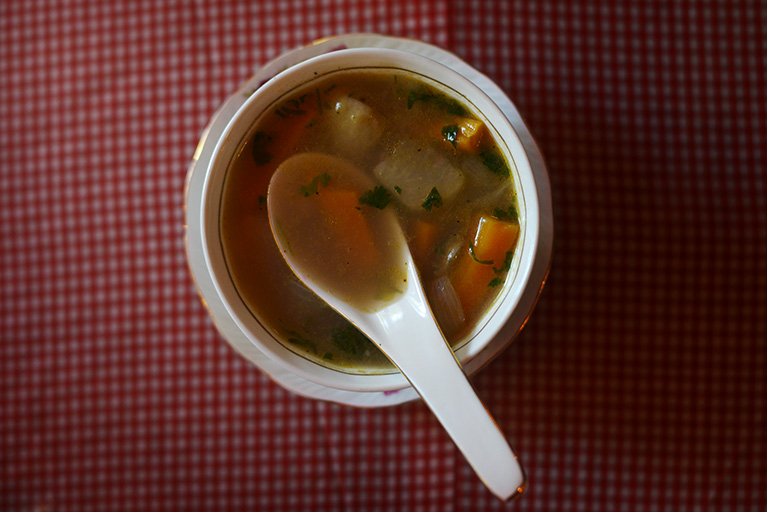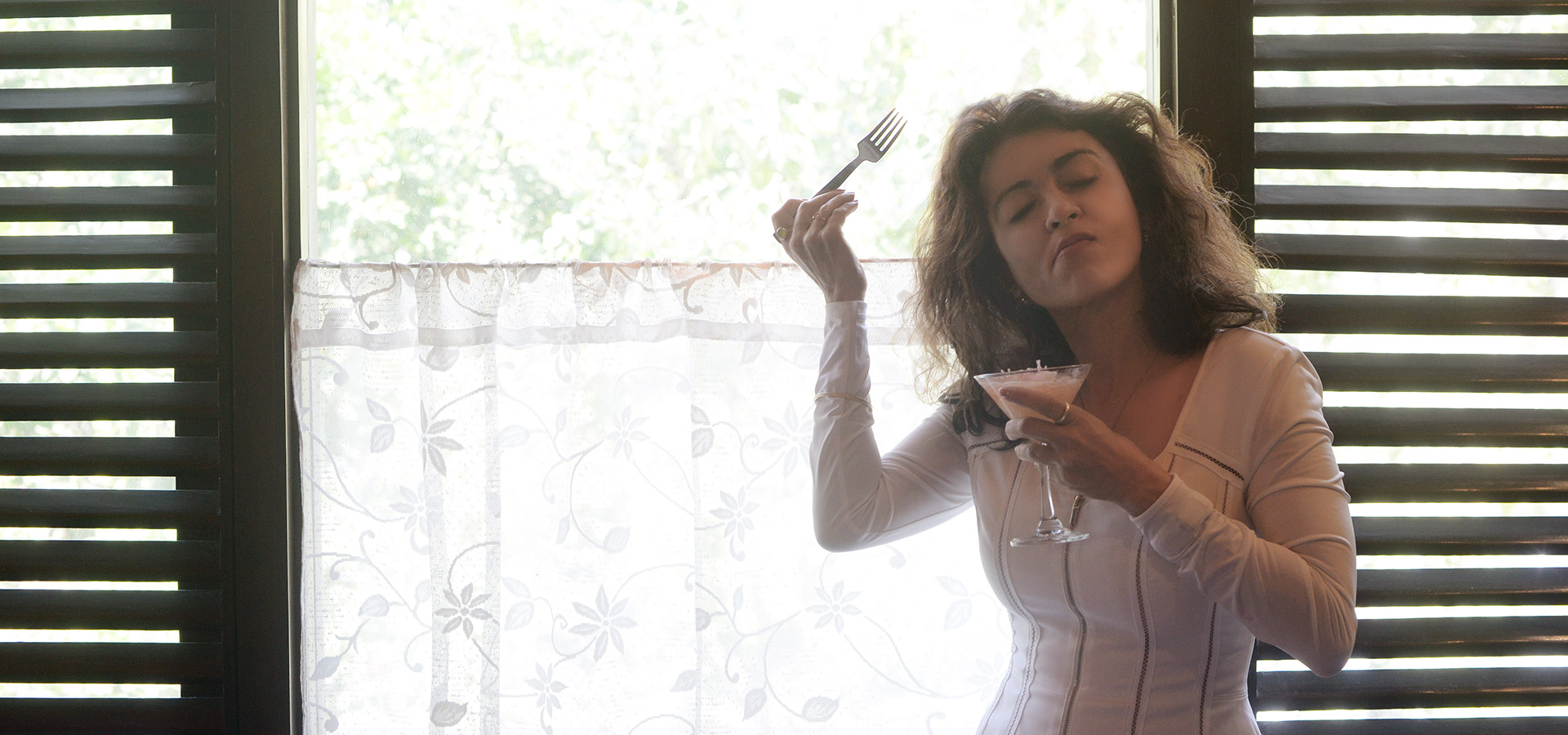Pop-ups and limited-edition menus have become the ideal way to sample a particular cuisine or culture in the manner of a test-drive: the experience without the commitment. More recently, SodaBottleOpenerWala—Delhi’s only Irani-themed cafe—got 90s-pop-singer-turned-chef Anaida Parvaneh to create a Persian menu that’s meant to run for over a month.
In the age of alternative therapies, Parvaneh believes food can reach out to people and teach them more about themselves, be it using the right ingredients to feel a certain way or even cooking a certain dish to cure a certain state of mind. Binge had a heart-to-heart and mind-to-mind with the vibrant half-Irani and half-Greek lady.
How did you get to linking psychology with food?
My mum was a healer and naturopath; I was a science student. I was the complete opposite to my mum because at that time, anything that did not add up didn’t make sense to me. Spirituality didn’t make sense. So, I studied a lot just to prove her wrong.
However, it was highly annoying to have a mother (may her soul rest in peace) who knows what you’re going to be doing even before you want to do it. I could say anything to her and she would tell me it was wrong. “You’re lying to me,” she’d say because could read me like a book. It was very frustrating, and for most of the time I went in that direction—studying. And then a lot of things happened to me: serious health issues, pretty big tragedies and I don’t want to bring anybody’s energies down by talking about it. I think pain makes you grow, or evolve. I started getting into the spiritual side of things. Food, I got into separately from that—out of desperation.
I know I don’t look it, but I eat like a pig. I eat constantly, and I even get “hangry”. I used to travel a lot too, and I was constantly sick. So, my more intimate relationship with food started out of desperation. I took my mum’s naturopathy teaching very seriously. In the beginning, since she was backing it with science, I knew what ingredient was good for what. I became very interested in studying it further and she gave me a lot of books. I started using her teachings to create food which was good to cook, nutritious to eat, and also healing. Now apart from that, I have a huge interest in psychology. I did three years of a character psychology course, so for me, it’s very exciting to watch people, seeing what makes them tick, why they do certain things, and I love playing with that.
How exactly do you play with psychology and food together?
I love games and riddles. I like solving things, and I like experimenting. I realised food was a way for people to connect. When I began to notice people eating, I found that there were very different kind of vibrations—depending on his or her mood, the same person could have a completely different attitude toward food on different days. I started thinking that I could try and play with people's mood via their food. It's a little bit similar to the placebo effect: giving someone sugar pills and telling them it cures cancer. That means it's all in your mind.
I used to be one of those people who hated spinach. I did not want to eat it, and then I said “what the heck man, eat it one time”. Similarly, I hated capsicum, and then I read about it and what it’s good for, and then a bite of it tasted different. So it’s important to first learn about the ingredients. For me, the final result of cooking must be that those eating the food feel good. So I started playing with it like that. It’s simple, plain cooking; not rocket science. I don’t like to hide behind the spice or the cooking. Some of the dishes on this menu are time consuming, but a lot of them can be cooked in 15 minutes—like the magic soup.

When you’re eating with awareness, it changes your world. Take rose petals, for instance. People ask whether Iranians use a lot of rose petals in their food. They use it in some food, but not as much as I do. I use it mostly in things that are uncooked (like cold drinks) because it doesn't take the flavour away and for that minute, if my conversation has already made you mindful of what you’re thinking or feeling, you will tune into the flavour of that rose and you will feel the love. You will feel the freshness, without you realising that it plays back on some memory from your childhood, which you might not even recognise. But the feeling persists. It's like when a particular hand-cream puts me in a good mood; I realise that at the time I had used it earlier, I was with a particular friend doing a particular activity.
I do that with the rose petals, or with the colour of the food. I add carrots to the magic soup, even though another ingredient has the same qualities. It's because I like that bit of orange. The minute you look at it, you say "Ah! I’m having something colourful". The minute you think colourful, you think childhood. And then you feel like that.
What about you? If you’re not feeling particularly great on a particular day, or you want to be in a certain mood, how would you personally change your mood with food?
For me, setting the mood starts the previous day. It starts with how I sleep. I’m going to do some woo-woo talk, not backed by science, but I’m sure if somebody researches it they will find something. Every time you sleep, there is a frequency that runs through you, which makes a difference in the body being alive or dead. Spiritually, it is believed that the everyday stress of life is heavy for a soul. Your soul needs to rest, and that is the reason you need to sleep. Every time you sleep and wake up, you can reset your whole life energetically. Take this from today’s conversation and research it yourself. And I would happily discuss it after.
Once, I went and asked my household help Tej bhaiya what he likes the most in the morning, and asked him to cut it for me the way that he enjoys it. He’s used to me being nuts. He did that, and it transferred the good energy that he created by thinking about what makes him feel good. Since he was describing it, I started connecting with it and felt it when I ate it. This was my way, but there are different ways. If you’re aware, still and mindful, your inner self will tell you what to do. Mine said that he was in a good mood, so ask him to transfer some of that to you.
However, if you want to put yourself in a good mood, don’t use food as comfort. It is not. You cannot use it as a substitute for emotions, lack of love, lack of whatever. You cannot say it's a de-stressor. If you’re in a bad mood, choose foods that are fresh. I would say avoid meat, not because meat is bad, but because the way the animals are treated is not good. They're stressed when they die and you end up putting that stress back into yourself. I’m not trying to be religious here, but if you’re in a bad mood: avoid meat.
Try and go for fresh things, or for food that you associates with good times. If, for example, banana was your favourite fruit when you were a child, and your mum gave you one everyt ime you went out to play, bananas will make you feel good. Use whatever you feel good about. Go for food that has association, which means you need to spend a certain amount of time with yourself, meditate, and then identify associations that work for you.




